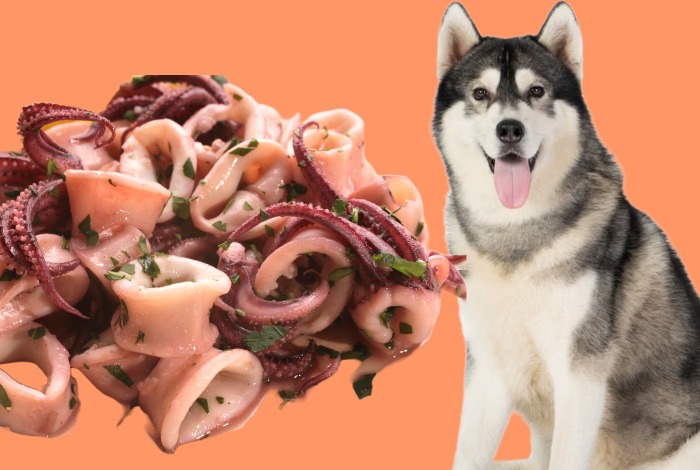Dogs can eat calamari and squid. thus they are essentially equivalent. or derived from the same animal at least.
Dogs may consume any marine animal that humans can eat, even octopuses. The carnivore dog thrives on an organic seafood treat like squid, so long as it’s meat and not harmful.
WHY feed a dog a squid dog treat.
Eating the same old kibble or wet dog food every day of their lives might bore dogs. Additionally, they may become bored and consume inappropriate food from the street and yard.
For many dog owners, feeding their pets nutritious, low-fat, and hypoallergenic food is their main priority. However, what if you could feed your dog something that was even more nutrient-dense than their traditional kibble, which often contains about 30% meat?
Benefits of Squid for Dogs
Moderate Protein: Since squid (also known as calamari) is a moderate protein, I wouldn’t offer it as the main source of protein with beef, turkey, venison, and pork.
Omega 3 Fatty Acids: Oily fish, such as salmon, sardines, and mackerel, are the finest sources of Omega 3 fatty acids. Squid is a passable source of these acids.
Mercury Levels: Among fish, calamari appears to be the least affected by mercury levels; trout, herring, and sardine have also tested low.
Choline: The best source of choline is eggs; squid is a fantastic source of this nutrient, which supports liver and brain function. Choline, pronounced co-lean, was the first ingredient I noticed was partially missing from my dog’s food when I made my first nutrient spreadsheet.
Selenium: A mineral that supports and fortifies the immune system, selenium is abundant in squid.
Copper is the one that worries me the most. Copper content in squid is high, however this is a good thing. An essential mineral for bone health, the neurological system, the heart, iron metabolism, and red blood cell production is copper. However, dogs’ liver function may be adversely affected by excessive copper. This protein will help me understand how much I can add to a meal prep without going beyond in terms of copper levels, therefore I would like to see it included in the ADF.
Calamari: has a high cholesterol content, but in dogs, this has a different meaning than in humans. Finding information about the effects of meals high in cholesterol on our dogs is difficult. Certain websites appear to be strongly opposed to fresh food or to only recommend it sparingly (as a treat). Based on this, if I had a dog that consistently performs well in their region when we perform blood work, I would talk to my veterinarian about these diets.
Is squid safe for dogs to eat?
Yes, squid is generally safe for dogs to eat and can be a healthy addition to their diet when prepared properly.
What are the nutritional benefits of feeding squid to dogs?
Squid is rich in protein, vitamins (such as B12 and B6), and minerals (like zinc and selenium), which can support your dog’s overall health, muscle development, and immune system.
How should squid be prepared for dogs?
Squid should be cooked thoroughly before feeding it to your dog. Remove any skin, bones, and excess fat, and cut it into small, bite-sized pieces to prevent choking.
Are there any risks associated with feeding squid to dogs?
While squid is generally safe for dogs, it’s essential to avoid giving them large amounts at once, as it can cause digestive upset. Additionally, some dogs may be allergic to seafood, so monitor your dog closely for any adverse reactions after introducing squid into their diet.
Can dogs eat raw squid?
It’s not recommended to feed dogs raw squid, as it may contain harmful bacteria and parasites that can make your dog sick. Always cook squid thoroughly to reduce the risk of foodborne illness.
How much squid can I give my dog?
Squid should be given to dogs in moderation as part of a balanced diet. Consult with your veterinarian to determine the appropriate serving size based on your dog’s size, age, and dietary needs.
Can dogs eat other seafood besides squid?
Yes, many dogs can safely consume other types of seafood, such as fish (like salmon and tuna) and shellfish (like shrimp and crab). However, it’s crucial to avoid feeding dogs seafood that’s been seasoned or prepared with ingredients that are harmful to them, such as garlic or onions.
Should I consult my vet before giving my dog squid?
It’s always a good idea to consult with your veterinarian before introducing new foods to your dog’s diet, including squid. Your vet can provide personalized advice based on your dog’s individual needs and any pre-existing health conditions they may have.
CONCLUSION:
The one thing to be mindful of is that, given that most dog food has between 4 and 10% fat, squid has a pretty high fat content. As a result, you might want to feed a bit less squid than a direct gram-for-gram replacement, as fat has 2.5 times the energy value of protein or carbohydrates.
Giving squid as a dog treat is a terrific way to keep them healthy. Until you are certain that your dog is on board, purchase the sample pack sizes or speak with your veterinarian if you are unsure.

